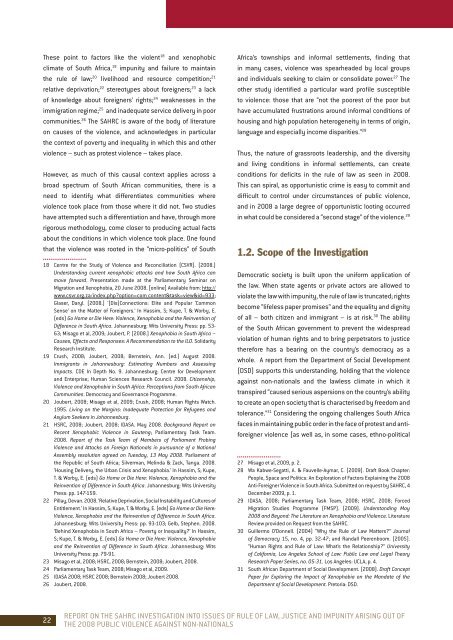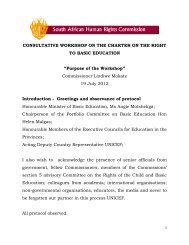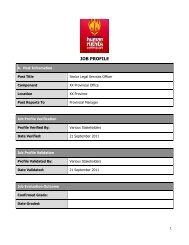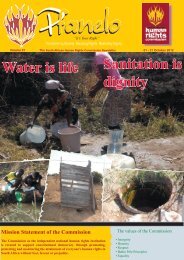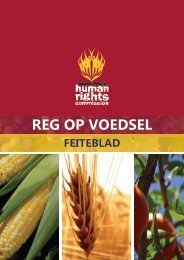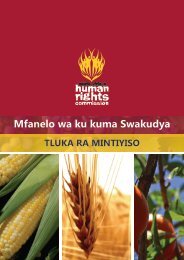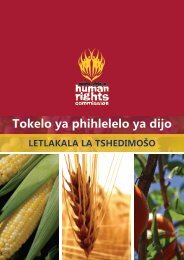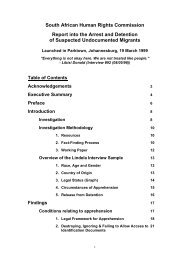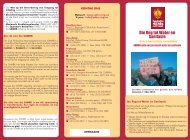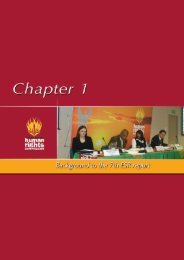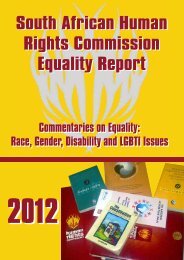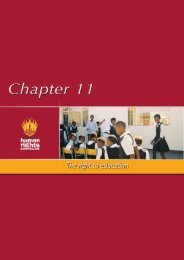Chapter 1 - South African Human Rights Commission
Chapter 1 - South African Human Rights Commission
Chapter 1 - South African Human Rights Commission
Create successful ePaper yourself
Turn your PDF publications into a flip-book with our unique Google optimized e-Paper software.
These point to factors like the violent 18 and xenophobic<br />
climate of <strong>South</strong> Africa, 19 impunity and failure to maintain<br />
the rule of law; 20 livelihood and resource competition; 21<br />
relative deprivation; 22 stereotypes about foreigners; 23 a lack<br />
of knowledge about foreigners’ rights; 24 weaknesses in the<br />
immigration regime; 25 and inadequate service delivery in poor<br />
communities. 26 The SAHRC is aware of the body of literature<br />
on causes of the violence, and acknowledges in particular<br />
the context of poverty and inequality in which this and other<br />
violence – such as protest violence – takes place.<br />
However, as much of this causal context applies across a<br />
broad spectrum of <strong>South</strong> <strong>African</strong> communities, there is a<br />
need to identify what differentiates communities where<br />
violence took place from those where it did not. Two studies<br />
have attempted such a differentiation and have, through more<br />
rigorous methodology, come closer to producing actual facts<br />
about the conditions in which violence took place. One found<br />
that the violence was rooted in the “micro-politics” of <strong>South</strong><br />
18 Centre for the Study of Violence and Reconciliation (CSVR). (2008.)<br />
Understanding current xenophobic attacks and how <strong>South</strong> Africa can<br />
move forward. Presentation made at the Parliamentary Seminar on<br />
Migration and Xenophobia, 20 June 2008. [online] Available from: http://<br />
www.csvr.org.za/index.php?option=com_content&task=view&id=933;<br />
Glaser, Daryl. (2008.) ‘(Dis)Connections: Elite and Popular ‘Common<br />
Sense’ on the Matter of Foreigners.’ In Hassim, S; Kupe, T. & Worby, E.<br />
(eds) Go Home or Die Here: Violence, Xenophobia and the Reinvention of<br />
Difference in <strong>South</strong> Africa. Johannesburg: Wits University Press: pp. 53-<br />
63; Misago et al, 2009; Joubert, P. (2008.) Xenophobia in <strong>South</strong> Africa –<br />
Causes, Effects and Responses: A Recommendation to the ILO. Solidarity<br />
Research Institute.<br />
19 Crush, 2008; Joubert, 2008; Bernstein, Ann. (ed.) August 2008.<br />
Immigrants in Johannesburg: Estimating Numbers and Assessing<br />
Impacts. CDE In Depth No. 9. Johannesburg: Centre for Development<br />
and Enterprise; <strong>Human</strong> Sciences Research Council. 2008. Citizenship,<br />
Violence and Xenophobia in <strong>South</strong> Africa: Perceptions from <strong>South</strong> <strong>African</strong><br />
Communities. Democracy and Governance Programme.<br />
20 Joubert, 2008; Misago et al, 2009; Crush, 2008; <strong>Human</strong> <strong>Rights</strong> Watch.<br />
1995. Living on the Margins: Inadequate Protection for Refugees and<br />
Asylum Seekers in Johannesburg.<br />
21 HSRC, 2008; Joubert, 2008; IDASA. May 2008. Background Report on<br />
Recent Xenophobic Violence in Gauteng; Parliamentary Task Team.<br />
2008. Report of the Task Team of Members of Parliament Probing<br />
Violence and Attacks on Foreign Nationals in pursuance of a National<br />
Assembly resolution agreed on Tuesday, 13 May 2008. Parliament of<br />
the Republic of <strong>South</strong> Africa; Silverman, Melinda & Zack, Tanya. 2008.<br />
‘Housing Delivery, the Urban Crisis and Xenophobia.’ In Hassim, S; Kupe,<br />
T. & Worby, E. (eds) Go Home or Die Here: Violence, Xenophobia and the<br />
Reinvention of Difference in <strong>South</strong> Africa. Johannesburg: Wits University<br />
Press: pp. 147-159.<br />
22 Pillay, Devan. 2008. ‘Relative Deprivation, Social Instability and Cultures of<br />
Entitlement.’ In Hassim, S; Kupe, T. & Worby, E. (eds) Go Home or Die Here:<br />
Violence, Xenophobia and the Reinvention of Difference in <strong>South</strong> Africa.<br />
Johannesburg: Wits University Press: pp. 93-103; Gelb, Stephen. 2008.<br />
‘Behind Xenophobia in <strong>South</strong> Africa – Poverty or Inequality?’ In Hassim,<br />
S; Kupe, T. & Worby, E. (eds) Go Home or Die Here: Violence, Xenophobia<br />
and the Reinvention of Difference in <strong>South</strong> Africa. Johannesburg: Wits<br />
University Press: pp. 79-91.<br />
23 Misago et al, 2008; HSRC, 2008; Bernstein, 2008; Joubert, 2008.<br />
24 Parliamentary Task Team, 2008; Misago et al, 2009.<br />
25 IDASA 2008; HSRC 2008; Bernstein 2008; Joubert 2008.<br />
26 Joubert, 2008.<br />
Africa’s townships and informal settlements, finding that<br />
in many cases, violence was spearheaded by local groups<br />
and individuals seeking to claim or consolidate power. 27 The<br />
other study identified a particular ward profile susceptible<br />
to violence: those that are “not the poorest of the poor but<br />
have accumulated frustrations around informal conditions of<br />
housing and high population heterogeneity in terms of origin,<br />
language and especially income disparities.” 28<br />
Thus, the nature of grassroots leadership, and the diversity<br />
and living conditions in informal settlements, can create<br />
conditions for deficits in the rule of law as seen in 2008.<br />
This can spiral, as opportunistic crime is easy to commit and<br />
difficult to control under circumstances of public violence,<br />
and in 2008 a large degree of opportunistic looting occurred<br />
in what could be considered a “second stage” of the violence. 29<br />
1.2. Scope of the Investigation<br />
Democratic society is built upon the uniform application of<br />
the law. When state agents or private actors are allowed to<br />
violate the law with impunity, the rule of law is truncated; rights<br />
become “lifeless paper promises” and the equality and dignity<br />
of all – both citizen and immigrant – is at risk. 30 The ability<br />
of the <strong>South</strong> <strong>African</strong> government to prevent the widespread<br />
violation of human rights and to bring perpetrators to justice<br />
therefore has a bearing on the country’s democracy as a<br />
whole. A report from the Department of Social Development<br />
(DSD) supports this understanding, holding that the violence<br />
against non-nationals and the lawless climate in which it<br />
transpired “caused serious aspersions on the country’s ability<br />
to create an open society that is characterised by freedom and<br />
tolerance.” 31 Considering the ongoing challenges <strong>South</strong> Africa<br />
faces in maintaining public order in the face of protest and antiforeigner<br />
violence (as well as, in some cases, ethno-political<br />
27 Misago et al, 2009, p. 2.<br />
28 Wa Kabwe-Segatti, A. & Fauvelle-Aymar, C. (2009). Draft Book <strong>Chapter</strong>:<br />
People, Space and Politics: An Exploration of Factors Explaining the 2008<br />
Anti-Foreigner Violence in <strong>South</strong> Africa. Submitted on request by SAHRC, 4<br />
December 2009, p. 1.<br />
29 IDASA, 2008; Parliamentary Task Team, 2008; HSRC, 2008; Forced<br />
Migration Studies Programme (FMSP). (2009). Understanding May<br />
2008 and Beyond: The Literature on Xenophobia and Violence. Literature<br />
Review provided on Request from the SAHRC.<br />
30 Guillermo O’Donnell. (2004) “Why the Rule of Law Matters?” Journal<br />
of Democracy 15, no. 4, pp. 32-47; and Randall Peerenboom. (2005).<br />
“<strong>Human</strong> <strong>Rights</strong> and Rule of Law: What’s the Relationship?” University<br />
of California, Los Angeles School of Law: Public Law and Legal Theory<br />
Research Paper Series, no. 05-31. Los Angeles: UCLA, p. 4.<br />
31 <strong>South</strong> <strong>African</strong> Department of Social Development. (2008). Draft Concept<br />
Paper for Exploring the Impact of Xenophobia on the Mandate of the<br />
Department of Social Development. Pretoria: DSD.<br />
22<br />
REPORT ON THE SAHRC INVESTIGATION INTO ISSUES OF RULE OF LAW, JUSTICE AND IMPUNITY ARISING OUT OF<br />
THE 2008 PUBLIC VIOLENCE AGAINST NON-NATIONALS


